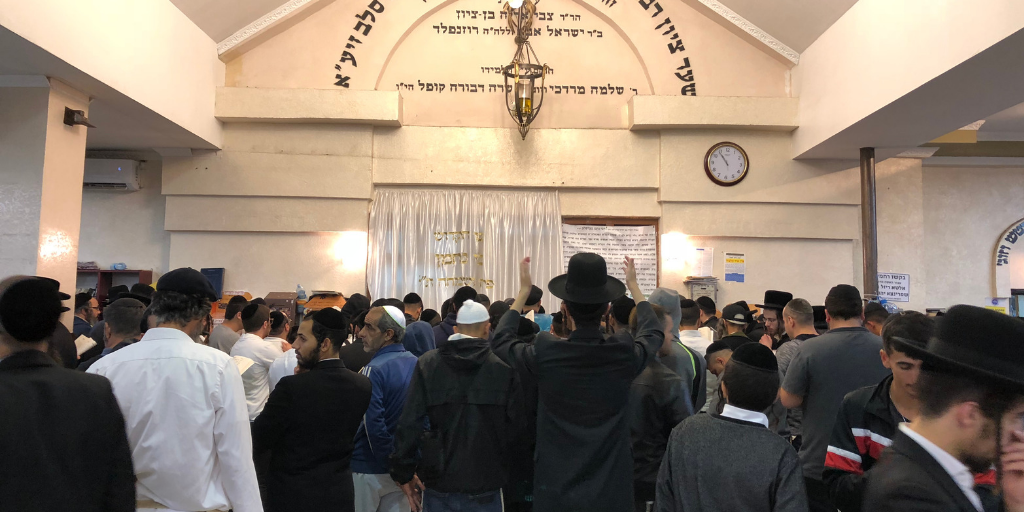What Uman Is Really Like On Rosh Hashanah

Not too long ago, Breslover Chassidim were so ridiculed that they were often compelled to hide their affiliation. When their friends and neighbors would hear that the Chassidim were willing to pay thousands of dollars to travel halfway across the globe to a backward town in the Ukraine for Rosh Hashanah, leaving their wives behind, they would loudly conclude that the Breslovers had lost their minds altogether.
How times have changed. Today upwards of 60,000 Jews, including many prominent rabbis, politicians, intellectuals and celebrities, join the annual pilgrimage to Uman for Rebbe Nachman’s Rosh Hashanah gathering. Many who are not (yet) Breslover chassidim come for a once in a lifetime spiritual boost, only to discover that they can’t fathom spending Rosh Hashanah anywhere else. What is the allure of Uman?
To describe Rosh Hashanah in Uman to the unaffiliated is nearly impossible—but I’ll give you a glimpse. Imagine the schlep of a lifetime. You pack your bags with whatever modern amenities you can squeeze in for a weeklong plunge into a country where most people are still living in the eighteenth century. Then you board one (or more) overbooked flights to Kiev filled with ecstatic Chassidim.
You immediately notice that your fellow Jewish travelers seem to have nothing in common. They hail from every conceivable background—young, old, rich, poor, religious, secular, Ashkenazi, Sephardi, and everything else. There is, however, one common denominator—they are all spiritual seekers. While some may be great “ovdei Hashem” and pious Chassidim, others are just simple Yidden whose lives haven’t turned out as planned. They, too, make the trek to Uman, hopeful for a new year and a new lease on life.
After the plane lands, there’s a three-hour shared van ride from Kiev to Uman. You peer through the window at a Ukraine that is a mix of ancient and modern, of horses and buggies alongside Mercedes SUVs, of dilapidated huts leaning on soaring skyscrapers. No doubt the awkward drive to Uman causes one to slowly let go of his day-to-day “norm” and expectations. Personally, I feel transported out of my perceived reality and into something entirely unknown. These feelings are replicated when I arrive in Uman. As I stare at the unremarkable streets and houses, I think, “How in the world am I going to spend an entire week in this place? What am I doing here?” But sure enough, at the end of this year’s voyage, I once again marvel how time flew by so quickly.
To followers of Rebbe Nachman, the logic behind making the trip to Uman is very clear: “The Rebbe once said that on Rosh Hashanah he was able to help people in ways that were beyond his ability during the rest of the year” (Tzaddik #406). He put so much stress on the importance of his Rosh Hashanah that he once exclaimed, “My very essence is Rosh Hashanah!” (ibid. #403). These statements complement the Rebbe’s famous promise to help anyone who says the Tikkun HaKlali (a specific set of ten Tehillim) beside his grave.
Now, imagine the experience of waking up at 2 am or 4 am any night and heading over to his gravesite. Located on the sacred ground where tens of thousands of Jews chose to sacrifice their lives rather than bow to the cross, the Rebbe’s gravesite has been converted into a shul that fits many thousands—and yet there are no seats to be had! On one side, a sea of Chassidim joyously sways in study, cries and screams while saying Tehillim, and pours out their heart in hitbodedut (personal meditative prayer). Opposite them, another crowd surrounds the grave, begging Rebbe Nachman for assistance. In such a place, teshuvah and prayer flow naturally.
While historically, Breslover Chassidim would travel to Uman together with their wives and children, the modern reality of so many converging on a few square blocks makes this no longer feasible. And while this arrangement demands tremendous self-sacrifice by the many wives left behind, I believe there is good justification for this. Can we not safely assume that most women would gladly send their husbands off on a business trip that promises to bring home a tidy sum? Why should spiritual gains be considered any less worthy? On the Day of Judgment, when so much is at stake, who wouldn’t want the help of a renowned Tzaddik who promised such a great return? Furthermore, in a world where materialism constantly beckons and overwhelms, wouldn’t every wife appreciate a more spiritually attuned husband?
It’s impossible to understand the otherworldliness of Uman, its spiritual heights and its promise for a new you, other than by experiencing it yourself. Yes, many will criticize various aspects of Uman, and the media always does a great job selecting the most disturbing videos and images of crazed individuals. The complaints regarding poor behavior and chillul Hashem actually disturb the Breslover Chassidim more than anyone else. Yet the vast majority of people who come to spend Rosh Hashanah in Uman are sincere.
Before judging the many on account of the few, please try this short exercise. Close your eyes and envision what things might actually look like when Mashiach arrives. You are there with your family, friends, neighbors and coworkers, along with everyone’s problems, issues and deficiencies. These continue to exist, only now you are joined by an incredible healer who fearlessly begins to work with each person at his level, no matter his shortcomings and failings.
While far from picture perfect, this is Rebbe Nachman’s pre-messianic vision of a place called Uman. See you next year!
Originally featured in the Jewish Press.